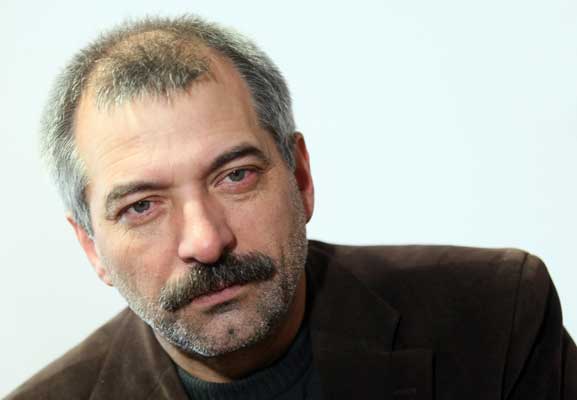In 1922 a group of prominent brainworkers suggested declaring 1 November the Day of Bulgarian National Awakeners - writers, educationists, martyrs and heroes from Bulgaria's glorious past who played a vital role in the upgrading of the Bulgarian national ideals and confidence over centuries. The same year the proposal was endorsed by the Council of Ministers. What urged the Bulgarian opinion leaders for such a campaign? We talked to the Dean of the Faculty of History of St. Kliment Ohridski University of Sofia, Prof. Plamen Mitev.
 „The urge for declaring a special day to commemorate the national awakeners is in the Bulgarian national memory. As a nation we sometimes tend to forget the people who have contributed into the spiritual emancipation of Bulgarian society. In the aftermath of the military catastrophes that Bulgaria lived through in the early 20 c. the need of a revival of the national memory was more than obvious. Therefore the brainworkers of Bulgaria united around the idea to dedicate a day to the great national awakeners.”
„The urge for declaring a special day to commemorate the national awakeners is in the Bulgarian national memory. As a nation we sometimes tend to forget the people who have contributed into the spiritual emancipation of Bulgarian society. In the aftermath of the military catastrophes that Bulgaria lived through in the early 20 c. the need of a revival of the national memory was more than obvious. Therefore the brainworkers of Bulgaria united around the idea to dedicate a day to the great national awakeners.”
In his Riddles and Apophthegms (apophthegm is an aphorism) writer Stoyan Mihailovski (1856-1927) wrote that we ought to fight any tyranny, even the tyranny of the unenlightened freedom. In fact, we often refer to the great awakeners from the National Revival (18-19 c.) but how fully do we comprehend their ideas?
„Unfortunately, we are driven by inertia when discussing our National Revival and the men who created the aura of that great era. We look at the past with a textbook mentality and easily forget the lessons that we had to learn after the Liberation from Ottoman rule. The National Revival is an era that we seemingly know well, but in all honesty we know only little about it. We are driven by inertia when grading the awakeners and we do not look for their individual inputs in Bulgarian history.”
Revolutionary Georgi Rakovsky (19 c.) argued that lack of knowledge about the nation's roots was what caused its persistent inferiority complex. Today, 150 years later we often claim that Bulgarians build national self-esteem based on their history. Is this true?
„Today history has been put to a string of political laboratory tests. We are used to arrogating political perusal of history to totalitarian societies, but we refuse to see that today in a seemingly democratic Bulgaria, history is manipulated and visible serves a range of political interests - in Bulgaria, the Balkans, in Europe or across the global political world. Rakovsky is still up-to-date, because we read our history in a one-sided way. Should we want to be objective we have to break away from the matrix, and explore the past free of ideology and myth so that we could live up to the confidence of a European nation.”
How could we explain the Bulgarian national mentality through the prism of the vicissitudes of history?
„Well, I hate to say it, but it seems that the main factor that influences the Bulgarian national mentality is the five-century long Ottoman rule - a time the nation was denied a national elite and statehood. This has strongly impacted on many generations of Bulgarians. Historically, we were brought up to doubt the state, because it is foreign to us. Regrettably, the inertia of this kind of behavior has had a persistent negative influence on Bulgaria's post-Liberation history to the present day. We discuss passionately political affairs in the tavern, café or in the street, but when a clear and open stance is needed, we twist and turn. We fall easy prey to the interest of our great brothers - be them Russia, Europe or the United States. This is also part of the national mentality inherited by a foreign yoke when we had no national leaders who would otherwise set traditions of political conduct. Deplorably, once every 40 to 50 years, Bulgaria's post-Liberation history sees radical turning points that send unworthy staff to top political offices. This is part of what has been happening to Bulgarians for longer than 500 years”, concludes Prof. Plamen Mitev.
English Daniela Konstantinova
558 Bulgarians aged 18, selected from 1,785 applicants, will be able to embark on their dream journey by train across Europe, learn from other cultures and build new friendships. They have been selected to receive a free travel pass through the..
In the era of increased digitalization and the penetration of artificial intelligence into all spheres of our lives, the professions of people with high qualifications and higher pay are most at risk of extinction. The least affected are jobs that..
Prayer served by His Holiness Bulgarian Patriarch Daniil on February 22, marks the beginning of the celebrations for the consecration of the new church "St. John of Rila" of the Bulgarian Orthodox community in London. For the..
Prayer served by His Holiness Bulgarian Patriarch Daniil on February 22, marks the beginning of the celebrations for the consecration of..
The festive service for the consecration of the new Bulgarian Orthodox church in London is led by His Holiness Daniil , Patriarch of Bulgaria, who also..
In the era of increased digitalization and the penetration of artificial intelligence into all spheres of our lives, the professions of people with high..

+359 2 9336 661
